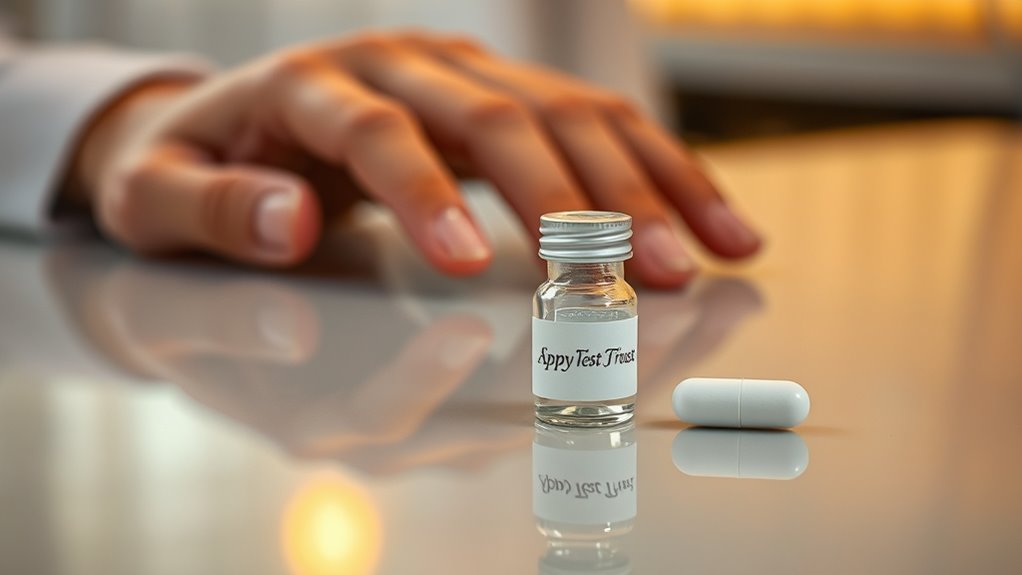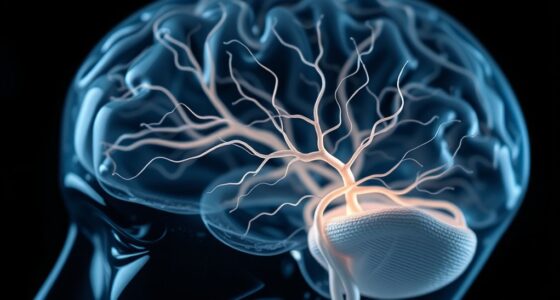Your beliefs and expectations play a powerful role in shaping how you experience health and healing. When you expect positive outcomes, your brain releases chemicals like endorphins and dopamine, which can reduce pain and boost mood. These psychological responses reinforce health benefits, even without active treatment. By understanding how your mindset influences physical responses, you can harness the hidden power of expectations to support your well-being—more insights await to help you activate this mind-body connection.
Key Takeaways
- Expectations activate neural pathways that trigger hormonal responses, influencing physical sensations and emotional states.
- Belief in a treatment’s efficacy can produce genuine physiological healing through neurochemical release.
- Positive expectations can reduce pain, anxiety, and enhance overall well-being via brain chemistry changes.
- The placebo effect demonstrates how perception alone can activate health responses, even without active treatment.
- Cultural, psychological, and visual cues shape beliefs, thereby influencing individual experiences and treatment outcomes.
The Science Behind the Placebo Effect

The placebo effect occurs when your brain responds to a treatment because you believe it will work, not because of the treatment itself. This response involves complex neurochemical pathways that activate in your brain, releasing chemicals like endorphins and dopamine. These neurochemical changes help reduce pain, improve mood, or influence other physical symptoms. Conditioning effects also play a significant role; if you’ve previously experienced relief from similar treatments, your brain starts to associate certain cues with healing. Over time, these learned associations trigger the same neurochemical responses even with placebo treatments. Color accuracy impacts the overall perception of the placebo effect because visual cues can reinforce expectations and enhance the perceived efficacy of a treatment. Fundamentally, your brain’s expectations can directly influence your body’s physical processes, demonstrating how powerful your mind can be in shaping your health through these neurochemical pathways and conditioning effects. Additionally, advances in neural network integration in AI research reveal that mimicking these biological processes can enhance our understanding of brain functions related to perception and expectation.
How Beliefs Influence Physical Health

Your beliefs can directly affect your physical health through the mind-body connection, shaping how your body responds to stress and illness. When you expect a treatment to work, it can trigger real physiological changes that promote healing. Recognizing the power of placebo as a healing tool shows just how influential your mindset truly is. For example, understanding signs of spoilage in consumables can help you make better choices about what to trust for your health. Additionally, awareness of AI vulnerabilities underscores the importance of critical evaluation of information and trustworthiness.
Mind-Body Connection
Beliefs have a powerful impact on physical health, shaping how your body responds to stimuli and stressors. When you hold positive beliefs, neural pathways related to emotional resilience strengthen, making it easier to cope with challenges. These pathways influence your nervous system, affecting hormone release and immune responses. For example, believing in your ability to heal can activate brain regions associated with optimism, leading to better health outcomes. Conversely, negative beliefs can weaken neural connections, increasing stress and vulnerability to illness. Your mind and body are interconnected; your thoughts and emotions directly influence physiological processes. Recognizing this link empowers you to cultivate beliefs that support resilience and well-being, demonstrating how your mental outlook can shape your physical health. Skincare patches are an example of how external tools can influence your skin’s healing process, highlighting the connection between belief and physical outcomes. Additionally, understanding the mind-body connection underscores the importance of nurturing positive mental states to promote overall health.
Expectation’s Physiological Impact
Expectations can profoundly influence how your body responds to health treatments and everyday stressors. When you believe a treatment will work, your brain activates specific neural pathways that trigger hormonal responses, such as the release of endorphins or stress hormones. These physiological changes can reduce pain, lower anxiety, or improve overall well-being. Your beliefs shape these neural circuits, reinforcing positive or negative outcomes based on what you expect. This process demonstrates that your mind doesn’t just influence thoughts but also directly impacts physical health. By holding strong positive expectations, you can encourage your body to produce beneficial hormonal responses, which may enhance recovery and resilience. Additionally, electric bikes and other modern technologies exemplify how expectations about performance and reliability can influence user satisfaction and perceived value. The way your mind perceives these experiences can significantly alter your overall well-being and satisfaction. Overall, your beliefs become a powerful driver of your body’s physiological state, bridging mind and body in health outcomes.
Placebo as Healing Tool
The placebo effect demonstrates how powerful the mind can be in healing, as simply believing in a treatment’s efficacy can trigger real physiological changes. This highlights the potential of placebos as healing tools, especially when your belief resilience remains strong. However, using placebos raises important questions about placebo ethics—whether it’s right to deceive patients for the sake of healing. When you trust in a treatment, your brain releases chemicals that promote recovery, illustrating how belief can directly influence health outcomes. Recognizing the role of belief influence emphasizes how expectations can shape physical health. Harnessing this effect responsibly requires understanding the delicate balance between ethical transparency and the mind’s capacity to heal. Interestingly, the effectiveness of placebos can vary depending on individual expectations and cultural factors, which are influenced by an understanding of diverse beliefs. Ultimately, recognizing the placebo’s role as a healing tool emphasizes the importance of fostering positive expectations without compromising honesty.
The Role of Expectation in Pain Management

Your expectations can directly influence how you perceive pain, often making it feel more or less intense. When you believe a treatment will work, your brain can actually enhance its effectiveness. This shows that expectation plays a powerful role in pain management, sometimes even boosting placebo responses. Recognizing the psychological factors involved can help individuals better manage their experiences of pain and fatigue. Additionally, understanding how mindset influences physical sensations can lead to more effective therapeutic approaches.
Expectation Alters Pain Perception
Have you ever noticed how your outlook can change the way pain feels? Your expectations can markedly influence pain perception. When you believe a treatment will work, your brain releases chemicals that reduce discomfort. This is where placebo ethics come into play, ensuring that expectation training is ethical and transparent. Your mind’s anticipation can actually lessen or amplify pain, highlighting the power of belief. Understanding this connection helps you harness your mind’s influence over pain. Additionally, the benefits of positive expectation can be harnessed to enhance overall pain management strategies, especially when combined with knowledge of regional legal resources that support health and well-being.
Placebos Enhance Treatment Efficacy
Expectations don’t just influence how you perceive pain—they can also substantially boost the effectiveness of treatments. When you believe a treatment will work, your brain can produce real physiological changes, enhancing outcomes. This phenomenon highlights the power of belief manipulation, where your mindset influences healing. Additionally, knowledge about paint sprayer mechanisms suggests that the effectiveness of treatments can be amplified through psychological means. Furthermore, research into community resilience indicates that collective belief and social support can play a significant role in recovery processes. However, placebo ethics questions whether it’s right to use deception to trigger such effects, as some treatments involve placebo controls. Despite ethical debates, evidence shows that placebos can amplify treatment efficacy, especially in pain management and other conditions. By harnessing positive expectations, healthcare providers can improve patient outcomes without additional drugs. Understanding this interplay emphasizes that your beliefs and the context of treatment are vital components in the healing process.
Psychological Mechanisms Driving the Power of Belief

The power of belief hinges on psychological mechanisms that shape how we perceive and respond to our experiences. Neural pathways strengthen as beliefs are reinforced, making certain responses automatic. Cognitive biases, like confirmation bias, skew our perceptions, reinforcing what we already believe. These mechanisms create a feedback loop, intensifying the effect of expectations. Understanding this interplay helps explain why belief can influence outcomes beyond physical factors. Here’s a simplified view:
| Mechanism | Effect |
|---|---|
| Neural pathways | Reinforce beliefs and responses |
| Cognitive biases | Filter information to confirm beliefs |
| Expectation | Shapes perception and experience |
| Conditioning | Connects belief with physical response |
| Feedback loop | Strengthens the power of belief |
This dynamic underscores how our mind actively crafts our experience through these psychological tools. Additionally, traits associated with covert narcissistic behavior can distort perceptions and reinforce false beliefs, further influencing how expectations shape reality. Recognizing the role of cognitive biases can help individuals develop more accurate perceptions and reduce the impact of distorted expectations.
Real-Life Examples of Placebo Impact

Real-life examples vividly demonstrate how the power of belief can produce tangible health and behavioral outcomes. For instance, patients’ mindset influence often determines treatment success, even when they receive inert treatments. Cultural beliefs also shape how people respond to placebos; in some societies, traditional remedies are so deeply ingrained that they trigger real physiological effects. A clinical trial might show patients experiencing pain relief after taking a sugar pill, simply because they believe it’s effective. Similarly, athletes reporting improved performance after consuming a “performance-enhancing” supplement—though it’s a placebo—highlight how expectations can drive results. These examples reveal that our beliefs, rooted in mindset influence and cultural beliefs, can activate real bodily responses, emphasizing the profound connection between mind and body. Additionally, understanding the placebo effect can influence how pet owners perceive and interact with their animals, further illustrating how expectations shape experiences.
Harnessing Expectations for Better Well-Being

By actively shaping your beliefs and outlook, you can harness the power of expectations to enhance your well-being. Mindset shifts and expectation management are key tools to do this. Focus on positive, realistic goals to foster confidence and resilience. Reframe setbacks as opportunities for growth, reinforcing a growth mindset. Use visualization techniques to set clear, beneficial expectations about your health and happiness. Here’s a simple guide:
| Action | Benefit |
|---|---|
| Practice gratitude | Boosts optimism and mood |
| Set achievable goals | Builds confidence and motivation |
| Visualize success | Strengthens belief in positive outcomes |
Frequently Asked Questions
Can Placebos Work Without Patients Knowing They Are Taking Them?
You might wonder if placebos work without your knowing. Yes, they can, because your mind warps illusions and subconscious triggers influence your experience. Even without awareness, your brain responds to cues and expectations, creating real effects. This subconscious processing shows how powerful your mind is, shaping your perception and pain relief, even when you’re unaware. Your beliefs and mind’s tricks can activate responses that feel authentic and tangible.
How Do Cultural Beliefs Influence Placebo Responses?
You might notice that cultural beliefs greatly influence how you respond to placebos. Cultural rituals and belief systems shape your expectations, making you more likely to experience relief or benefits. When you trust traditional practices or hold strong cultural convictions, your mind is primed to perceive positive effects. These cultural influences enhance placebo responses by reinforcing your belief that the treatment will work, demonstrating how deeply your background affects your experiences.
Are There Ethical Concerns With Using Placebos in Treatment?
You might wonder if using placebos in treatment raises ethical concerns. It can, especially around informed consent and deception ethics. When you don’t tell patients they’re receiving a placebo, it risks violating their right to make informed decisions about their care. However, some argue that if placebos can provide relief without harm, their use could be justified. Balancing honesty with effective treatment remains a key ethical challenge.
Does Age Affect How Strongly Belief Impacts Health Outcomes?
Thinking about age-related perceptions is like watching a plant grow; your beliefs about health evolve over time. As you age, your belief maturity can influence how strongly your expectations impact health outcomes. Younger individuals might be more open to new ideas, while older adults often have more ingrained perceptions. This shift affects how belief shapes your experiences, with age acting as a key factor in the power of expectation on health.
Can Placebo Effects Be Sustained Over Long-Term Treatments?
You wonder if placebo effects can last during long-term treatments. While some studies show initial benefits, maintaining sustained benefits over time is challenging. The long-term efficacy of placebo depends on factors like patient expectations and the treatment context. To achieve lasting results, combining placebo strategies with real medical interventions may help. Ultimately, understanding how expectations influence outcomes can improve how you approach ongoing health management.
Conclusion
Think of your mind as a gardener tending a garden. Your beliefs and expectations are the seeds you plant—nurture positive ones, and vibrant blooms of health and relief will flourish. Doubts are weeds that hinder growth. By tending your garden with care and optimism, you shape your experience, turning the power of belief into a force that cultivates well-being. Remember, your mind holds the key to your inner landscape—choose what to nurture.









